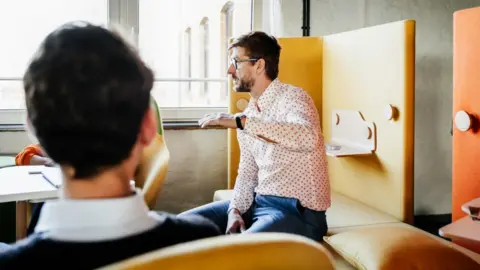Bristol's climate debates lack diverse voices, study finds
 Getty Images
Getty ImagesA study has said there is a "worrying lack of diversity" in city-wide debates and decisions made over climate change.
The University of Bristol spent one year focussing on the work of six climate change bodies, both public and private sector, in the city.
Researcher Dr Alix Dietzel said: "From what we know from global negotiations, which is what I studied prior to this research, this is quite common."
The mayor of Bristol, Labour's Marvin Rees, has welcomed the report findings.
"Certain voices dominate the discussion and it tends to be the most privileged in society and obviously in our case that would be white men," Dr Dietzel added.
The six bodies reviewed were:
- Bristol One City Environment and Economics Board
- Bristol Advisory Committee on Climate Change
- Arup
- Cycling Works
- Black and Green Ambassadors
- Liveable Neighbourhoods
Mr Rees, said: "While it's encouraging that Bristol is recognised as a leader in responding to climate change, this report provides cause for all organisations championing climate action to reflect on their representation and decision making."
Bristol City Council oversees the Bristol One City Board, while the Bristol Advisory Committee on Climate Change is an independent committee established by the University of Bristol and the University of the West of England (UWE) at the request of the mayor.
'Select few'
Mr Rees said the council was supporting programmes to help develop diverse talent such as the Stepping Up project and the Black and Green Ambassadors but added they were "starting points".
He added: "The burden of meeting the immediate and long-term challenges we face cannot rest on a select few individuals and organisations.
The year-long study conducted in Bristol revealed 5% of participants at meetings to discuss transition to a net zero future were men of colour, and they spoke only 1% of the time.
The voices of women of colour accounted for 2% of debate time, despite making up 14% of participants.
People of colour make up 16% of Bristol's population, according to Bristol City Council.
The study found white men and white women were almost equally represented, making up 40% and 41% of participants respectively.
But discussion time was dominated by white males, with this group speaking almost twice as much as their female counterparts at 64% of the time compared to 33%.
Published in the run-up to the Cop26 climate talks in Glasgow, the study's authors warned the findings undermined Bristol's pledge for a "just transition" to net zero carbon emissions by 2030.
They said policymakers were increasingly aware of how important it was to include more marginalised groups in climate talks.
'Trust to engage'
This is because those from poorer backgrounds are more vulnerable to climate change because they are more likely to live in lower quality housing and lack the resources to move to escape heatwaves or flooding, the study says.
Disabled people are also vulnerable, as they often need specialist housing, making it difficult to relocate.
Dr Dietzel added: "It's not just speaking, it is getting people in the room and to feel they want to be part of these processes, to feel the trust to engage and perhaps to feel that they can make a difference and that they belong."
The BBC has approached all those reviewed in the report, funded by the university's Cabot Institute for the Environment, for a response.
The Bristol Green Capital Partnership and Ujima Radio, which together run the Black and Green ambassador programme, said they welcomed the findings and were also committed to bringing in more diverse voices to climate debates.
Cycling Works Bristol said its main aim was to highlight the "voice of employers" and its organisation was made up of mainly volunteers.
Liveable Neighbourhoods said it was delighted to be part of the study and was very aware that "too often, conversations are happening between people who look and sound the same, with similar views and from similar backgrounds".
- Sustrans and Fossil Free Bristol were named in the initial policy briefing and were mentioned in the original version of this article, published on 11 October 2021. The study was later changed to include different public and private sector bodies and this was amended in the article, also on 11 October 2021.

Follow BBC West on Facebook, Twitter and Instagram. Send your story ideas to: [email protected]
